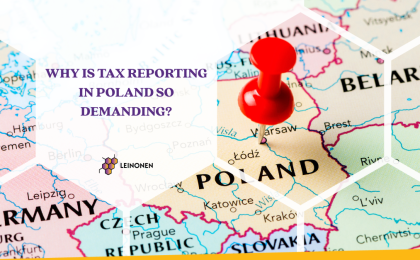Key Considerations for Foreign-Owned Business in Poland
Poland is increasingly popular among companies looking to expand or establish a presence abroad. A skilled workforce, an increasingly stable economy, and improving infrastructure make business in Poland attractive. However, to succeed, you must navigate elements such as company formation, regulation, taxation, payroll, and compliance.
In this article, Leinonen Poland explains the basics you need to know about employment, payroll, and taxes in Poland.
Company Establishment in Poland
To guarantee easier market access and to gain trust in Poland, establishing a legal entity is recommended. Choosing which type of entity to form is a critical step, affecting taxes, liability, and ongoing compliance. While there are a whole host of (rarely used) options, the most common legal form among entities with foreign capital is a limited liability company (LLC).
Taxation in Poland
Corporate Income Tax (CIT) in Poland
As a standard, companies in Poland pay 19% CIT. However, certain conditions make some businesses eligible to pay a lower CIT rate of 9%.
- Small taxpayers whose annual revenues, including VAT, did not exceed EUR 2 million in the previous tax year (converted according to average National Bank of Poland exchange rate)
- Taxpayers starting a new business (for their first tax year in operation)
Value Added Tax (VAT) in Poland
The standard VAT rate in Poland is 23%, but there are four potential VAT rates for goods and services.
The following reduced rates are applicable to certain goods and services:
- 8% VAT is applicable to goods and services including (but not limited to) certain food products, newspapers and periodicals, animal feeding stuffs, and transport of passengers and accompanying luggage
- 5% VAT rate is applicable to basic foods, products for children and hygiene products, printed books, books on disks, tapes and other media, and e-books (with some exceptions)
- 0% VAT rate is applicable to services including (but not limited to) the intra-European supply of goods, international transport services, and the supply of goods to free zones or customs warehouses
Employment & Payroll in Poland
Employment in Poland is governed by the Labour Code. This applies equally, and must be complied with by both the employer and the employee.
Salary in Poland
The average gross salary in Poland is appr. PLN 9,583 per month. Minimum wage is PLN 4,806 per month, which equates to PLN 31.40 hourly.
Personal Income tax (PIT) in Poland
The amount of PIT an employee pays depends on the amount of income earned:
- Up to PLN 30,000 per year – no income tax payable
- Up to PLN 120,000 per year – 12% income tax
- Over PLN 120,000 per year – 32% tax
Social Security in Poland
Poland’s social security system consists of three main categories:
- The Social Insurance Institution (ZUS)
- Obligatory pension funds (OFE)
- Voluntary pension funds
Overall, employers pay around 22.14% of the employee’s gross salary to social security contributions including pensions, disability insurance, accident fund, labour fund, Guaranteed Employee Benefits Fund, and Employment Capital Plans (PPK) fund. Employees pay around 13.71%, amounting to a total social security rate of 35.85%.
Special Economic Zones are widely used, and companies can be granted various tax benefits when investing in certain regions. Consulting local experts on tax in Poland will help you better understand these nuances.
Terminating Employment
There are three methods of terminating an employment agreement in Poland: termination by mutual consent, termination with notice, and termination without notice. Unless an employee is still on a probation period, a valid reason must be given for terminating the employment.
Non-Residents and Expats
Non-residents who work for a foreign-owned business in Poland that has a permanent establishment or fixed place of business in the country must pay tax on their income.
If the employer does not have a permanent establishment or fixed place of business in Poland, income tax must be paid once the employee has spent more than 183 days in total in the country.
Poland is an increasingly popular destination for expats. As part of the European Union (EU), the Polish labour market is open to all EU citizens. Many foreigners working in Poland operate fully under the Polish system, but other solutions are possible depending on country of origin. For example, if an expat can prove being under the social security of another EU country, payment of certain social costs (ZUS) can be avoided.
How Can Leinonen Support Your Business in Poland?
Setting up to do business in a brand new country can be confusing. If you are considering establishing your foreign-owned business in Poland, you need a local expert by your side. Drawing upon 17 years in Poland serving 80+ clients, Leinonen’s cross-border experts assist you with accounting, payroll, taxes, legal compliance, and company setup. We help you avoid common pitfalls, streamline operations, and ensure local regulations are followed right from the start.
Get in touch today to organise a consultation.





